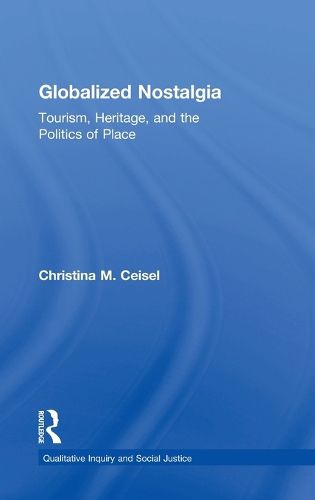Readings Newsletter
Become a Readings Member to make your shopping experience even easier.
Sign in or sign up for free!
You’re not far away from qualifying for FREE standard shipping within Australia
You’ve qualified for FREE standard shipping within Australia
The cart is loading…






In Globalized Nostalgia, Christina Ceisel shows how national identity is being remade for the global marketplace. Through media, cultural events, foodways, and personal narratives, we see how notions of the past are mobilized towards varied political, economic, and cultural ends.
In Galicia, Spain, Ceisel points towards tourism as one mode of cosmopolitan engagement, revisiting food festivals, wine tours, fishing excursions and reality television shows. She identifies globalized nostalgia as a feeling deeply connected to national identity - that these ‘performances’ of tourist activity rely on claims to an authentic past based on heritage for value to the consumer. While such strategies work to brand the nation, Ceisel demonstrates how they may also be employed towards emancipation and an inclusive participatory democracy.
Placing her own lived experience within the context of our historical present, relying on interpretive methods, including performance autoethnography, Ceisel highlights the tensions embedded in contemporary transnational cultural politics. Through the development of innovative methodological tools, Ceisel points towards new ways of thinking about the politics of belonging. Ultimately, Ceisel argues that we need to reorient our understandings of authenticity and heritage to accommodate the realities of hybridity and diaspora.
$9.00 standard shipping within Australia
FREE standard shipping within Australia for orders over $100.00
Express & International shipping calculated at checkout
In Globalized Nostalgia, Christina Ceisel shows how national identity is being remade for the global marketplace. Through media, cultural events, foodways, and personal narratives, we see how notions of the past are mobilized towards varied political, economic, and cultural ends.
In Galicia, Spain, Ceisel points towards tourism as one mode of cosmopolitan engagement, revisiting food festivals, wine tours, fishing excursions and reality television shows. She identifies globalized nostalgia as a feeling deeply connected to national identity - that these ‘performances’ of tourist activity rely on claims to an authentic past based on heritage for value to the consumer. While such strategies work to brand the nation, Ceisel demonstrates how they may also be employed towards emancipation and an inclusive participatory democracy.
Placing her own lived experience within the context of our historical present, relying on interpretive methods, including performance autoethnography, Ceisel highlights the tensions embedded in contemporary transnational cultural politics. Through the development of innovative methodological tools, Ceisel points towards new ways of thinking about the politics of belonging. Ultimately, Ceisel argues that we need to reorient our understandings of authenticity and heritage to accommodate the realities of hybridity and diaspora.